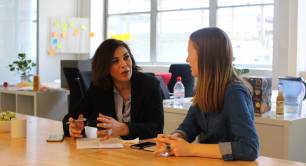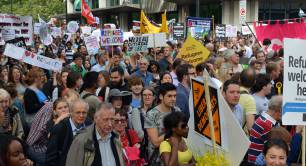Refugee athletes make history at IAAF World Championships
Despite not winning any medals at the recent World Athletics Championships in London, one team has left its mark.
The Athlete Refugee Team (ART) has given us a different story to tell: both on and off the track, the Kenya-based Team are changing attitudes to refugees, representing 65 million stateless people worldwide as the first ever refugee squad to compete at the Championships.
The five refugee athletes from Somalia, Ethiopia, and South Sudan competed in either the 800m or 1500m, some having received just a few months of training.
Though none progressed beyond the heats, the International Association of Athletics Federations (IAAF) World Championships has once again increased the profile of the team after their first appearance in the 2016 Rio Olympics.
The International Olympic Committee made the decision to create the first ever refugee team in an unprecedented political statement, breaking chapter five of the Olympic Charter which states that no ‘political, religious or racial propaganda is permitted in the Olympic areas.'
The IAAF Team - Ahmed Farah, Angelina Nadi, Dominic Lobalu, Rose Lokonyen and Kadar Abdullahi - were all scouted by the Tegla Loroupe Peace Foundation whilst staying in a refugee camp in Kenya.
The foundation, which was set up by long-distance runner Tegla Loroupe, has been leading the way in pushing for refugee representation in international sporting events. Loroupe won the bronze medal twice at the World Championships over 10,000m. She also holds world records for 20, 25, and 30km and was the first African woman to win the New York marathon.
Her organisation is partnered with the IAAF’s social responsibility programme, Athletics for a Better World.
As well as a new sporting home, the foundation gives the scouted athletes accommodation and facilities away from the refugee camp, as well as the chance to train alongside Loroupe. The foundation provides a home for the five, all of whom were displaced at a young age, as well as 26 other refugee athletes from five nations.
For Angelina Nadi, the team is a collective triumph: "I compete on behalf of all the refugees around the world," she said after her race.
Nadi is a refugee from South Sudan who, like all of the team, fled repeated attacks on her home and has been separated from her parents for the past 10 years.
She came last in the 1500m heats, but says she is not motivated by statistics: "(There are) so many people behind me, watching me competing, and I give them a lot of hope."
For Mursal Hedayat, CEO and founder of Chatterbox – a UK-based social enterprise that trains and employs refugees for work in the language services sector – ART "serves as an important reminder that refugees retain their innate talents and abilities despite being forced to abandon their homes and communities."
"When we frame refugees solely as people coming from troubled countries and crises it fuels perceptions that they themselves are problematic. Telling the positive side of their stories, their resilience and achievements, can be a powerful counter-narrative," Hedayat says.
Photo credit: duncan c



